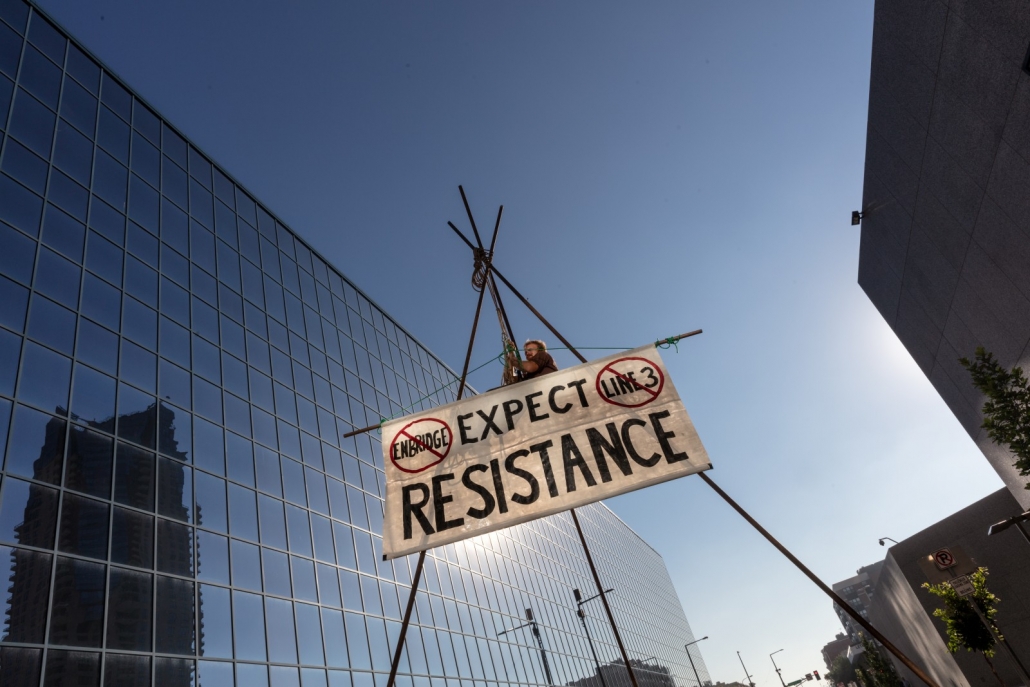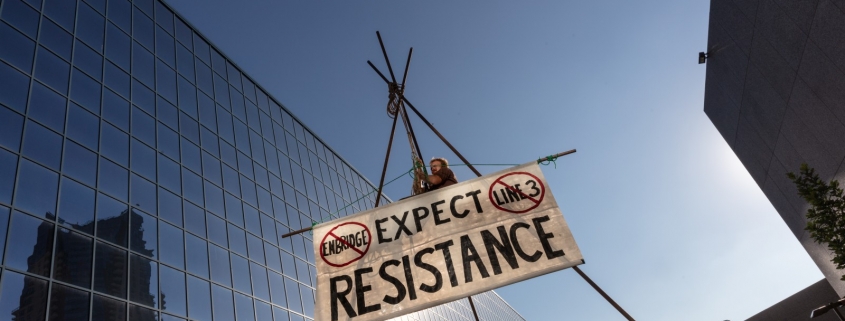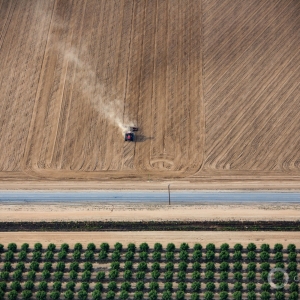HotSpots H2O: Anishinaabe Activists and Allies Resist Enbridge Line 3 Pipeline, a Project that Threatens Wetlands and Ignores Treaty Territory

A Line 3 protestor outside the Minnesota Public Utilities Commission, St. Paul. Photo © Lorie Shaull / Flickr Creative Commons
By Christian Thorsberg, Circle of Blue
In northern Minnesota, the new Line 3 corridor, proposed by the Canadian oil company Enbridge, cuts directly through wetlands and waterways that are already struggling in unusually dry conditions. The pipeline also infringes upon centuries-old tribal treaty rights, and runs near, and sometimes through, reservation lines, water crossings, and state forests.
For the Anishinaabe who live in northern Minnesota, Line 3 is a cultural and ecological transgression. They say an oil spill would threaten the health of wild rice, a crop that grows in watersheds the pipeline would cross. Known as “that food which grows on water,” wild rice is what drew the tribe from the east coast to the Midwest many years ago. Their cultural existence here, and subsistence, is founded upon it.
For Indigenous activists and their allies, together known as Water Protectors, demonstrations in Hubbard County against the oil pipeline grew more urgent this month, as workers began its construction. On these Midwest wetlands, communities whose homes have been taken far too many times are organizing tirelessly, at great personal risk, to protect their land and culture.
Held aloft before a landscape of drill rigs, excavators, police cars and pumps, their protest signs highlighting messages of struggle and pride: “Relatives Not Resources”; “No Pipelines on Stolen Land”; “Protect Water.” A Department of Homeland Security helicopter appears in the sky and hovers near the peaceful crowd, kicking up a heavy whorl of dust and debris. In this artificial wind, two yellow flags are defiantly flown, the words they display pointed and strong: “Respect Treaties”; “Water is Life.”
“This is everything that we have, it is our water, it is our rice, it is our future,” said Winona LaDuke, the internationally renowned activist, Honor the Earth program director, and White Earth reservation resident in northern Minnesota. “I’m going to stand for the water and I’m going to stand for what’s right and that’s the future we are going to make.”
Six pipelines run through northern Minnesota, each transporting a variety of hydrocarbons, including toxic tar sands and bitumen, from Alberta, Canada, to Superior, Wisconsin. One of the lines, Line 3, has “extensive corrosion” and would require 7,000 digs to repair, according to its replacement project director. As a result, in 2014, the Canadian company Enbridge moved that a new, larger Line 3 be built, a proposition that immediately disregarded indigenous land rights and Anishinaabe culture. Enbridge does not plan to remove the old Line 3 and says that the new pipeline will be operated safely.
“There’s always a cost to what the United States considers development,” said John Kane, the host of the Let’s Talk Native podcast, on his episode about Line 3. “Usually, those who bear the brunt of those costs are native people.”
By some estimates, the volume of oil that will travel through this new pipeline will produce a carbon footprint larger than Minnesota itself: 193 million tons of carbon dioxide emitted each year, which is more than the entire state generates annually.
In recent weeks in Hubbard County, where the drilling has begun under the eye of a growing police presence, Water Protectors have paired their lobbying and legislative efforts with non-violent blockades and marches. Nonetheless, hundreds of arrests have been made, including that of Alan Weisman, a journalist merely covering the protests.
“It’s not only a violation of our treaty rights and the expansion of the fossil fuel industry, and climate change and all of that,” said Tara Houska, a Couchiching First Nation activist and founder of the Giniw Collective, “it is a threat to our ability to survive and pass on our practices of wild rice to the next generation and to generations to come.”
Correction: An earlier version of this story misspelled Tara Houska’s last name. It has now been corrected.
Christian Thorsberg is an environmental writer from Chicago. He is passionate about climate and cultural phenomena that often appear slow or invisible, and he examines these themes in his journalism, poetry, and fiction.







Leave a Reply
Want to join the discussion?Feel free to contribute!